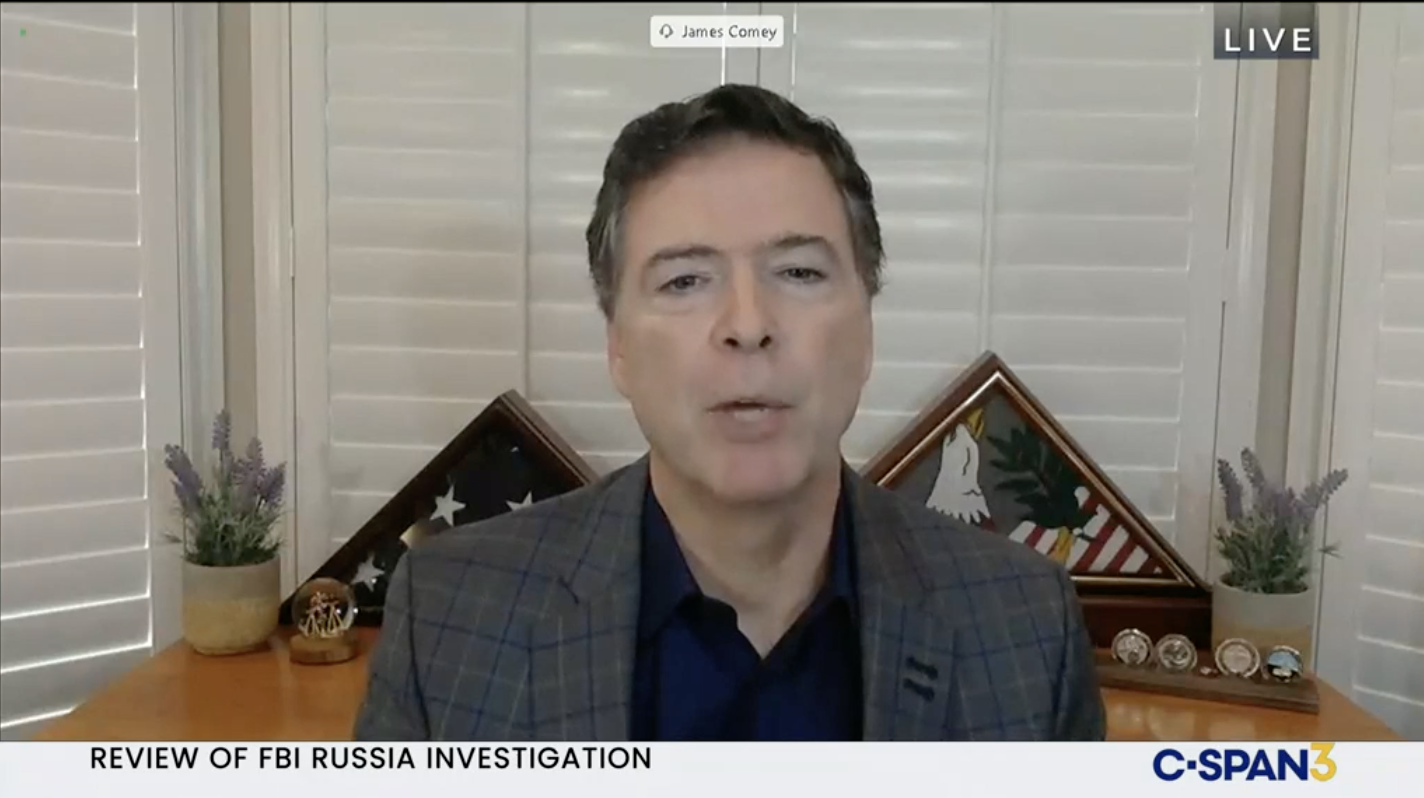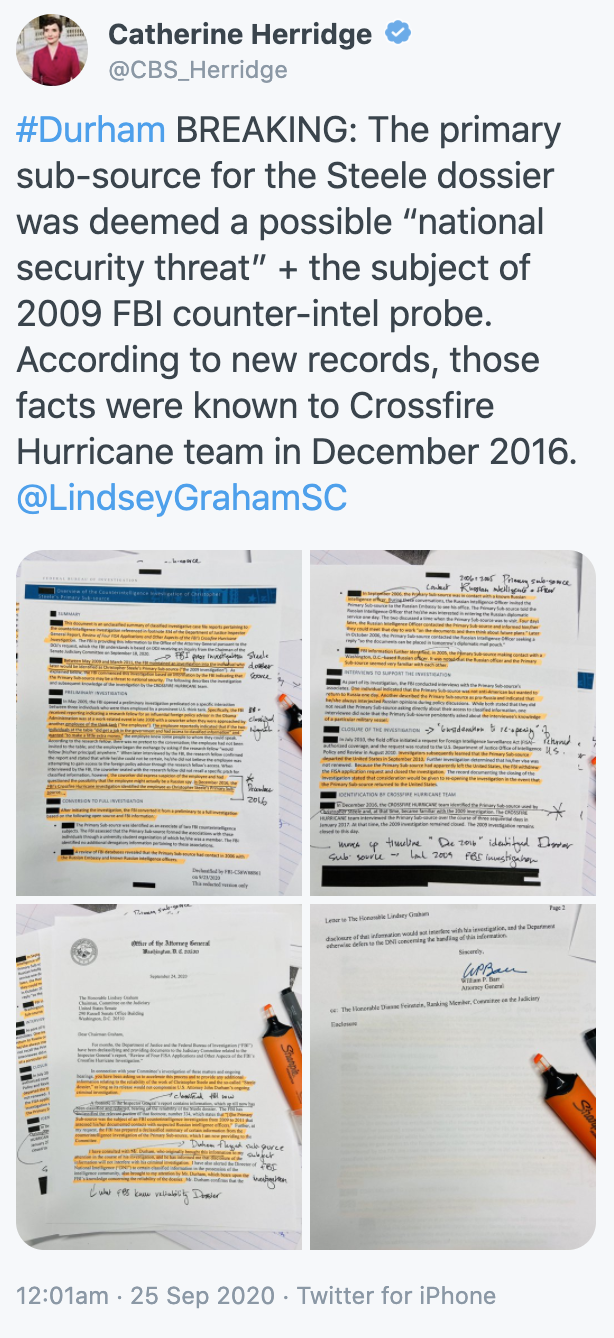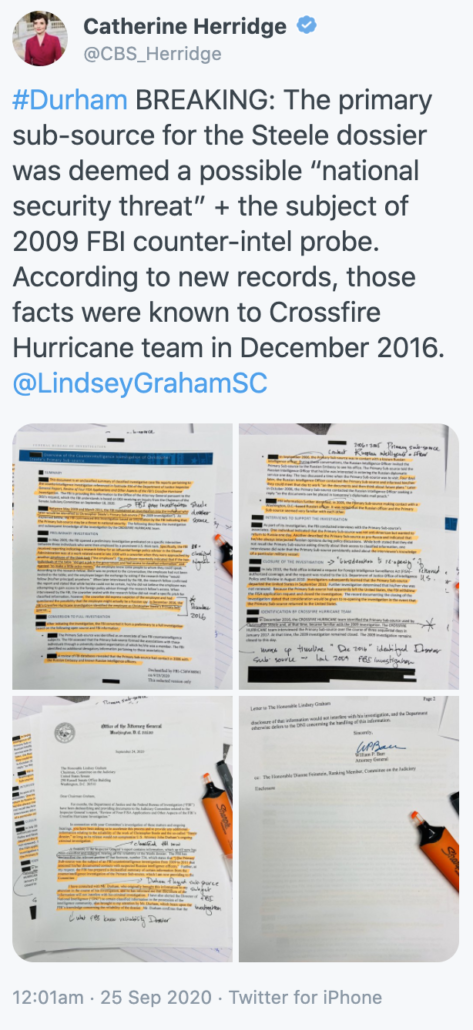“Yes and No:” John Durham Confuses Networking with Intelligence Collection
John Durham apparently believes li’l ol’ emptywheel is smarter than an entire team of seasoned FBI counterintelligence professionals. That’s the only conclusion I can draw from his effort to explain why a lie he accused — but did not charge — Igor Danchenko of telling was material to an ongoing investigation. Durham claims that in his first set of interviews, Danchenko was deliberately and knowingly hiding how indiscreet he had been about his intelligence work for Christopher Steele.
Such lies were material to the FBI’s ongoing investigation because, among other reasons, it was important for the FBI to understand how discreet or open DANCHENKO had been with his friends and associates about his status as an employee of U .K. Investigative Firm-1, since his practices in this regard could, in turn, affect the likelihood that other individuals — including hostile foreign intelligence services — would learn of and attempt to influence DANCHENKO’s reporting for U.K. Investigative Firm-1.
The alleged lie in question (which, as I’ll show, Durham misrepresents) is that Danchenko claimed to the FBI that he “never mentioned that he worked for [Christopher Steele or Orbis] to his friends or associates.”
In response, DANCHENKO falsely stated, in sum and substance, that while certain friends were aware that DANCHENKO worked generally in due diligence and business intelligence, DANCHENKO never mentioned that he worked for U.K. Person-I or U.K. Investigative Firm-1 to his friends or associates. DANCHENKO further stated, ”you [the FBI] are the first people” he had told. DANCHENKO added that the reason he never told associates about his relationship with U .K. Person-1 and U .K. Investigative Firm-1 was the existence of a non-disclosure agreement he signed with U.K. Person-1 and U .K. Investigative Firm-1.
As noted, Durham makes this claim based off Danchenko’s first series of FBI interviews in late January 2017.
It’s rather confusing that Durham claims Danchenko was hiding how indiscreet he was in those interviews, because after I read heavily redacted summaries of those very same interviews last year, I laid out a slew of ways that Danchenko and Steele were making themselves vulnerable to discovery:
PSS [Danchenko] described that his debriefings with Steele were always at the Orbis office, which meant if Steele himself were surveilled, PSS’ ties to Steele would become obvious.
[snip]
[H]is communications with Steele included many insecure methods. He first met Steele in a Starbucks. Early on, he communicated with him via email and Skype, and Steele would task him, at least in part, via email. He described discussing [Carter] Page’s trip to Russia with Source 3 on some kind of voice call, possibly a phone, while he was at a public swimming pool, though he also described talking in an opaque way about election interference. Likewise, the most problematic December 13 report was based on a conversation with the same source, which was also a phone call.
In short, while Steele and PSS and PSS’ sources made some efforts to protect their communications from the Russians that surely considered Steele a target, those efforts were inconsistent.
PSS described making three trips to Russia for his election year reporting. On the second trip, he got grilled suspiciously at the border. On his third, “nothing bad happened,” which made PSS suspicious about how perfectly everything had gone.
PSS repeatedly described being uncomfortable with the election year tasking, and he seems to have had suspicions in real time that Russia had taken note of it.
I also noted that two of Danchenko’s sources — to whom he admitted he worked in business intelligence — attempted to task him to collect information (indeed, Olga Galkina, described as S3 here, had done so just days before this interview, after the publication of the dossier by BuzzFeed, which she subsequently admitted to reading in detail when it came out). A third — someone Danchenko believed had close ties to an FSB officer — had gotten Danchenko to help him get a scholarship to study in the UK with help from Orbis.
And both Source 2 and Source 3 — the sources for some of the more problematic information in the Steele dossier — knew PSS brokered intelligence. Both also discussed brokering information in Russia.
[S3] is one of the individuals who knows that [PSS] works for due diligence and business intelligence. [As an aside at this point, [PSS] insisted that [S2] probably has a better idea about this than does [S3] because [S2] is always trying to monetize his relationship with [PSS]. [PSS] reiterated again to interviewers that [S2] will often pitch money-making ideas or projects — “Let’s work together. I [S2] can try and get [redacted] to answer a question, but I’ll need some money to do it.”] [S3] has an understanding that [PSS] is “connected.” In fact, either [redacted] morning or [redacted] morning, [S3] reached out to [PSS] and asked him for help in [redacted] on how [redacted] living in the United States are viewing the Trump administration. She is asking him [redacted] by the weekend, probably so she can sell it to a friend in Moscow.
And because PSS asked Orbis to help S1 — the guy with close ties to an FSB officer — get a scholarship for language study in the UK, S1 presumably knows what Orbis and who Steele is.
In other words, in the interview where (Durham claims) Danchenko lied to hide how indiscreet he was, he provided substantive reason to believe he hadn’t been at all discreet with three of his claimed dossier sources.
On top of that, the analyst who wrote up the report noted several times when Danchenko’s answers contradicted his early assertion that he himself had no known ties to Russian intelligence (there’s far more evidence that Danchenko knowingly lied about ties to Russian spooks than any of the charges laid out here, but that doesn’t serve Durham’s narrative and so instead he’s charging more random lies).
Thanks to Bruce Ohr’s help vetting Steele (for which he got fired), the FBI also learned that Steele was working for Oleg Deripaska, a central player in the election-year operation and one of the several obvious ways that Russia would have learned of this project.
If anyone at the FBI came away from these early interviews believing that Steele and Danchenko were exercising adequate operational security for this project (even ignoring Steele’s blabbing to the press), they had no business working in counterintelligence. Then again, Peter Strzok attempted to carry out an extramarital affair on an FBI device that (DOJ IG investigations would later disclose) happened to have a serious vulnerability built into it by a vendor. And in my own very limited experience, the FBI had uncomfortably shoddy operational security. So maybe there’s something to that.
Danchenko candidly told the FBI a number of things that should have given them ample reason to believe the project had been compromised. Importantly, that includes a warning that Galkina knew he was in business intelligence, the single most important detail as laid out in the Danchenko indictment. For Durham to suggest that Danchenko was withholding such details when, in that first interview, he carried out a debate with himself about which of two sources, including Galkina, knew more about his intelligence gathering is, frankly, batshit insane.
Worse still, Durham misrepresents what Danchenko was asked and how he answered.
As noted above (in bold) Durham claimed that Danchenko lied by saying that he, “never mentioned that he worked for Steele or Orbis to his friends or associates.” Durham, as is his sloppy habit, doesn’t quote either the question or Danchenko’s response. As a result, Durham hid the material fact that Danchenko was not asked whether he revealed that he worked for Orbis, but whether he told people he collected intelligence for them. And he didn’t answer, “no;” he answered, “yes and no.”
Here’s the question and the response that Durham didn’t bother to quote in the indictment.
[Danchenko] was asked how he “covers” his queries with his sources. He typically tells his sources that he is working on a research project or an analytical product. He was also asked if there were friends, associates, and/or sources who knew that he was collecting information for Orbis. He said, “yes and no,” and explained that some of his closer friends understand that he works in the area of due diligence and business intelligence. Many of the think that he is doing projects for entities like [redacted], the [redacted], or think tanks [redacted. They don’t know that he works for Orbis, as he signed a non-disclosure agreement and told not to talk about the company. He has never mentioned Chris Steele or Orbis to his friends and associates. He emphasized that “you [the FBI] are the first people he’s told.” [my emphasis]
Danchenko was not asked, generally, whether he talked about Orbis, which is what Durham claims he was asked. Danchenko was asked about how he covers his queries. He was specifically asked if his associates knew “that he was collecting information for Orbis.”
His answer was not “no,” but instead, “yes and no,” because people knew he was collecting intelligence. And (as noted above) he would refer back to the follow-on answer — that his friends understood that he works in business intelligence — by explaining that two of his claimed dossier sources, including Olga Galkina, not only knew that he collected intelligence, but had attempted to task him to collect it themselves. The context of whether he mentioned Steele or Orbis was explicitly a reference to him being paid (through a cut-out arrangement he had just described to the FBI) for intelligence collection by Orbis, not whether he ever networked using Steele’s name.
This is important because some of the “proof” that Durham provides that Danchenko was affirmatively lying that he had told people “he was collecting information for Orbis,” includes stuff that doesn’t mention intelligence collection. There’s nothing about two April 2016 communications with Charles Dolan, for example, that suggest Danchenko appeared to be more than an analyst, which is what he was on paper.
For example, on or about April 29, 2016, DANCHENKO sent an email to PR Executive-I indicating that DANCHENKO had passed a letter to U.K. Person-I on behalf of PR Executive-I. Specifically, the email stated that DANCHENKO had “forwarded your letter” to [U.K. Person-I] and his business partner. “I’ll make sure you gentlemen meet when they are in Washington or when you are in London.”
That same day, DANCHENKO sent an email to PR Executive-1 outlining certain work that DANCHENKO was conducting with U.K. Investigative Firm-1. The email attached a U.K Investigative Firm-1 report titled “Intelligence Briefing Note, ‘Kompromat’ and ‘Nadzor’ in the Russian Banking Sector.”
Indeed, a later reference to these exchanges describes it as “broker[ing] business,” not discussing collecting intelligence.
For example, and as alleged above, DANCHENKO attempted to broker business between PR Executive-1 and U .K. Person-1 as early as in or about April 2016. See Paragraphs 23-25, supra.
Nor does a later email Dolan sent definitively describe Danchenko as collecting intelligence.
Monday night I fly to Moscow and will meet with a Russian guy who is working with me on a couple of projects. He also works for a group of former [allied foreign intelligence service] guys in London who do intelligence for business …. [H]e owes me as his Visa is being held up and I am having a word with the Ambassador.
Durham makes much of the fact that, by the time the dossier was published, Dolan knew that Danchenko was behind it. But Durham provides no evidence about how Dolan learned that (even though Dolan was interviewed by the FBI somewhere along the way). It’s possible, for example, that Dolan put two and two together on his own and/or asked Galkina. And — as Danchenko freely offered up in his first interview! — Galkina knew he was in the intelligence business, so it’s likely she figured it out and told Dolan, not least because the two had shared business interests harmed by the dossier’s allegations, in the last report, about Webzilla.
To be clear, after having obtained warrants on (presumably) all three — Danchenko, Dolan, and Galkina — Durham did find one person with whom Danchenko was clearly discussing the topic he was asked about, collecting intelligence for Steele (as opposed to doing analysis, brokering business, or otherwise networking).
For example, on or about July 28, 2016, DANCHENKO sent a message to an acquaintance and stated “Thanks to my reporting in the past 36 hours, [U .K. Person-I] and [U.K. Investigative Firm-I Employee] are flying in tomorrow for a few days so I might be busy . . . . ” In addition, on or about September 18, 2016, DANCHENKO sent a message to the same acquaintance stating that DANCHENKO had “[w]ork to do for [U.K. Person-I] who’s probably coming to DC on Wednesday.” U.K. Person-I did, in fact, travel to Washington. D.C. on or about September 21, 2016.
That person is either not central to Durham’s narrative, or has reason to have known, because Durham doesn’t explain who it is. But if this person were not, for some reason, read into Danchenko’s cover story, or if the person is sufficiently memorable that Danchenko should have remembered these exchanges, then it does amount to proof that Danchenko answered incorrectly to that January 2017 question.
But all the things that Durham presents to suggest this answer was intentional — perhaps to insinuate that Danchenko didn’t hide the project because it made it more likely Galkina and Dolan would feed him bullshit — are, in fact, related to a different question, a question the FBI did not ask.
There’s one more thing that’s truly bizarre about Durham’s decision to include this allegation (again, it is not charged), particularly given that Danchenko freely offered up information making it clear Galkina knew a fair bit about Danchenko’s intelligence collection. According to the indictment, after that initial interview, the FBI interviewed Danchenko on — at a minimum — March 16, May 18, June 15, October 24, and November 16, 2017. Along the way, the FBI identified Galkina as a subject of particular interest and collected her communications under Section 702 which (among other things) identified precisely the relationships at the core of this indictment, presumably a response to the candid comments Danchenko made in that January 2017 (as well as the fact that she was his claimed source for the dodgiest claims).
But seemingly the FBI never revisited the question about how well Danchenko hid his intelligence collection and his relationship with Christopher Steele.
Perhaps that’s because Danchenko said enough in that first interview to make it clear that neither he nor Steele did adequately protect that relationship. The FBI didn’t return to that question — or the one Durham falsely claims he was asked — because he had already provided the answer with his other descriptions.
Danchenko posts
The Igor Danchenko Indictment: Structure
John Durham May Have Made Igor Danchenko “Aggrieved” Under FISA
“Yes and No:” John Durham Confuses Networking with Intelligence Collection
Source 6A: John Durham’s Twitter Charges
John Durham: Destroying the Purported Victims to Save Them
John Durham’s Cut-and-Paste Failures — and Other Indices of Unreliability

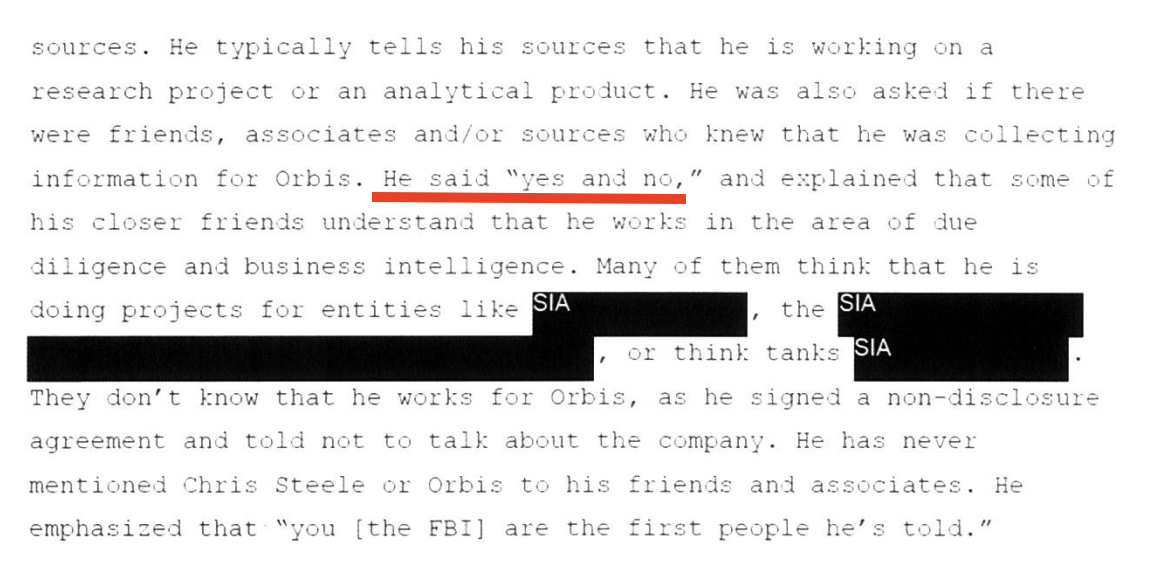

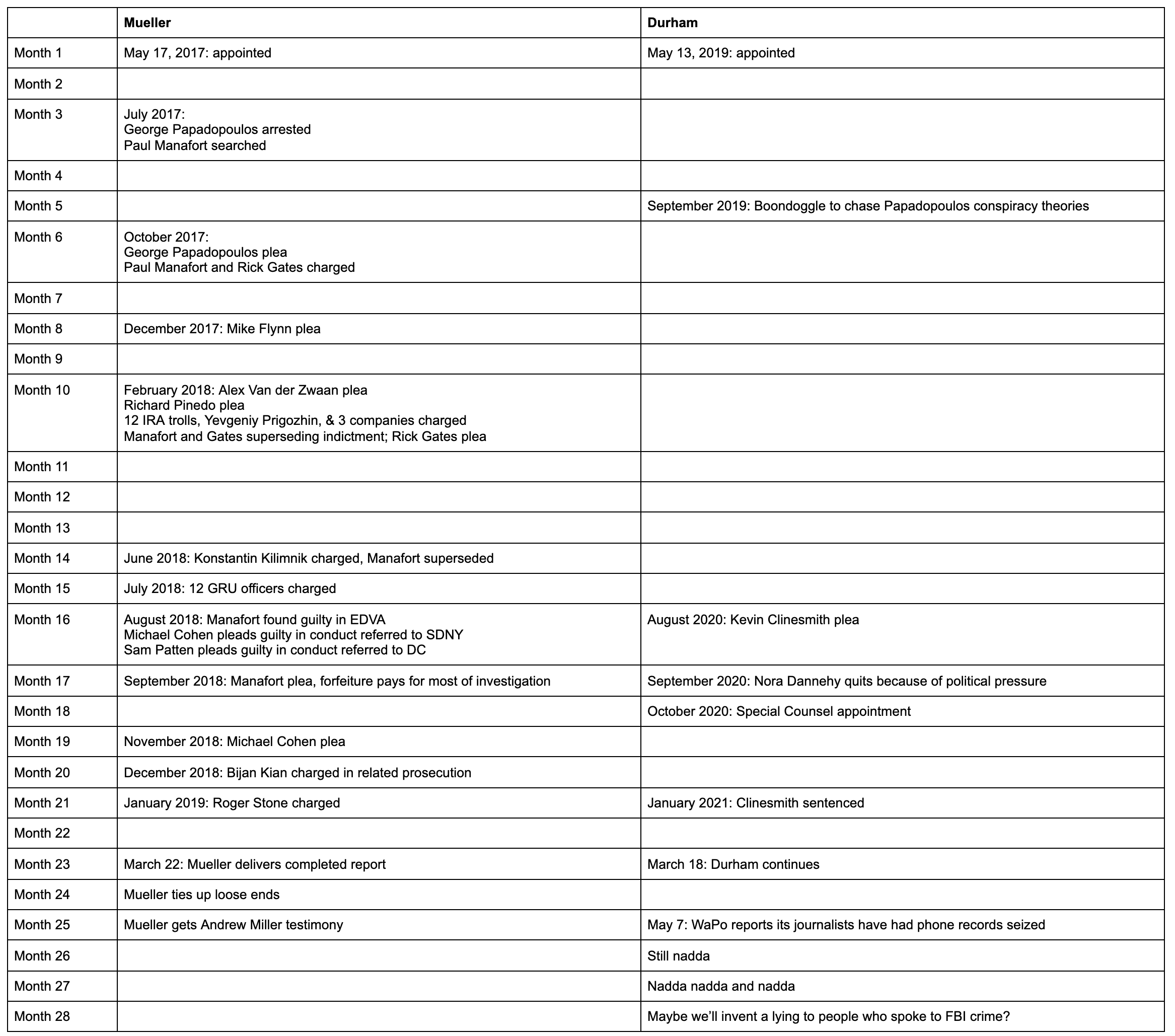
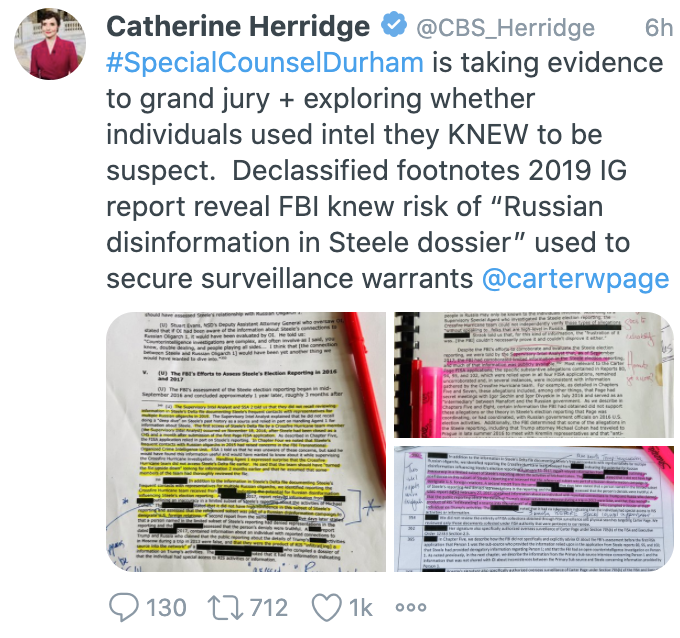
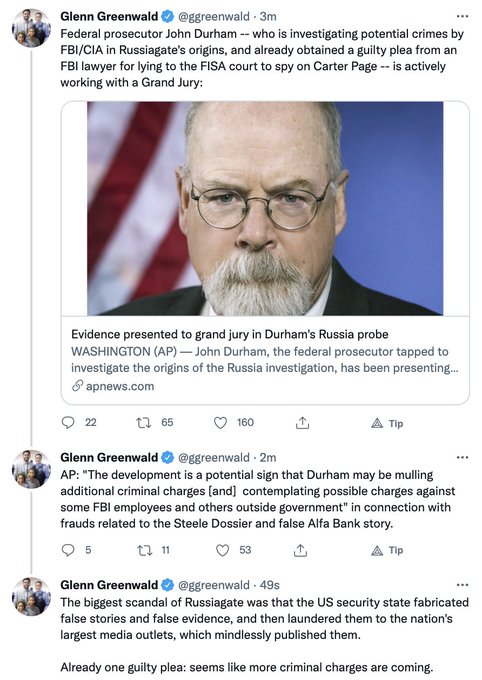

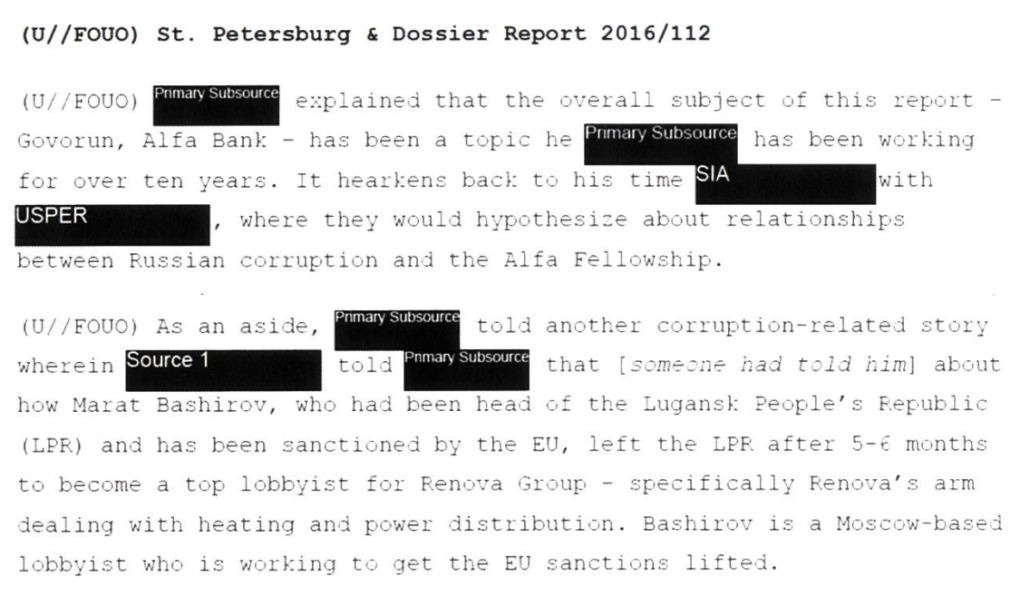

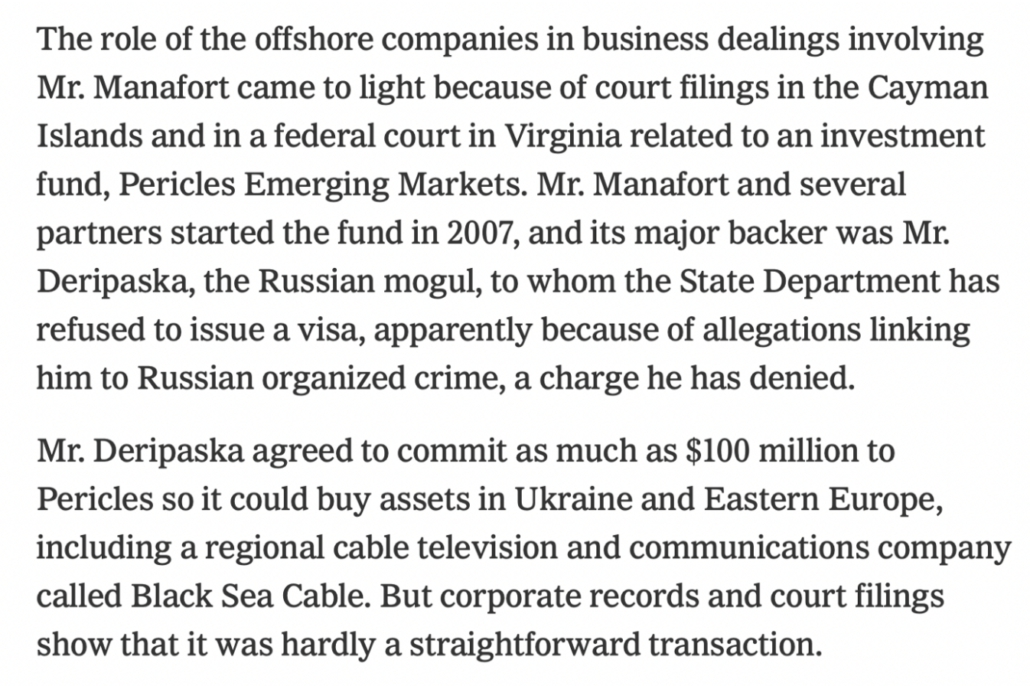
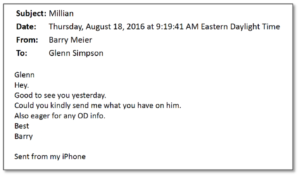
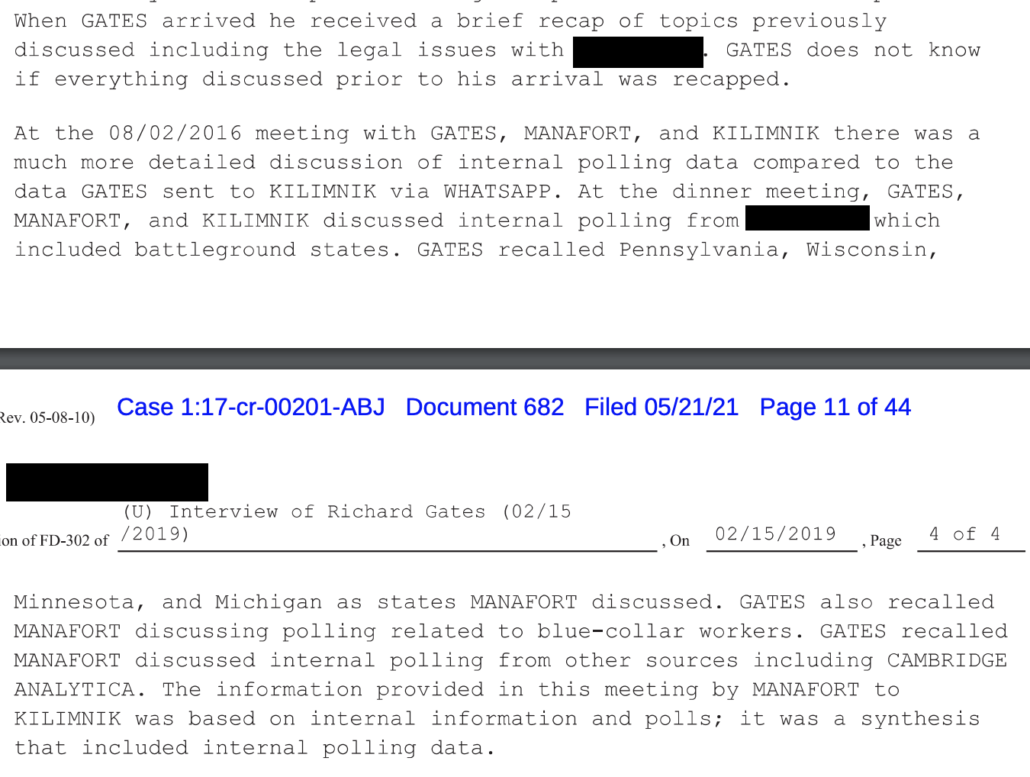
![[Photo: National Security Agency, Ft. Meade, MD via Wikimedia]](https://www.emptywheel.net/wp-content/uploads/2017/08/NationalSecurityAgency_HQ-FortMeadeMD_Wikimedia.jpg)

